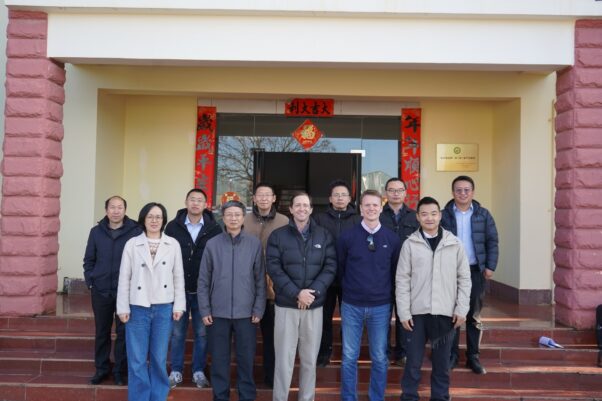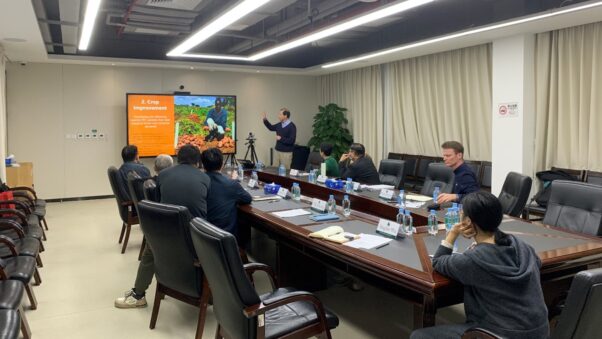PRESS RELEASE
02 February 2024 (Beijing) – The Deputy Director General for Research, Dr. Hugo Campos, from the International Potato Center (CIP), recently concluded a successful visit to China, aimed at strengthening collaborative efforts in potato and sweetpotato research and innovation. Dr. Campos visited some key locations, Yunnan Normal University, Yunnan YinMore Modern Agriculture Co., Ltd. in Kunming, Yunnan Province, and the Agricultural Genomics Institute of Shenzhen of the Chinese Academy of Agricultural Sciences (AGIS-CAAS) in Shenzhen, Guangdong Province.

On January 31st, Dr. Campos engaged in fruitful discussions at YNNU, Yunnan YinMore Modern Agriculture Co., Ltd., meeting with former Dean of the Joint Academy for Potato Science of YNNU Professor Canhui Li, Director General of YinMore, Mr. Hai Yang and colleagues. This provided a valuable opportunity to discuss and align strategies for cooperative research projects under the CIP-China Center for Asia Pacific (CCCAP).
On February 1st, at the Agricultural Genomics Institute of Shenzhen (AGIS), Dr. Campos met with Mr. Zemin Cui, the Secretary of the Party Committee and Deputy Director General of AGIS, along with Dr. Ren Wang, Senior Advisor of International Cooperation of AGIS. These meetings further solidified the collaboration between CIP and AGIS, laying the groundwork for innovative research initiatives.

During the meetings, Dr. Campos underscored four key areas of emphasis:
- Commitment to Chinese Farmers: Dr. Campos reiterated CIP’s commitment to Chinese farmers, highlighting the organization’s dedication to delivering high-quality potato and sweetpotato varieties in China.
- Support for the Genome to Phenome (G2P) Project: CIP expressed its wholehearted support for the Genome to Phenome (G2P) project in China. Dr. Campos emphasized the importance of assembling a robust team of researchers to achieve impactful results, ultimately improving productivity and income for farmers in China and beyond
- Hybrid Potato Innovation: Drawing parallels with China’s success in developing hybrid rice by China’s true food hero Yuan Longping, Dr. Campos shared CIP’s belief that a similar success story could be achieved with hybrid potato varieties in China. This innovative approach holds the potential to revolutionize potato cultivation and contribute to agricultural success.
- CCCAP as a Hub for Capacity Building: Dr. Campos highlighted the growing significance of CIP’s CCCAP facilities, located less than 30 minutes by train from Beijing, in driving potato and sweetpotato innovation in China. CCCAP is poised to become a hub for capacity building, supporting research on potato and sweetpotato, as well as collaborating with other research centers of CGIAR involved in G2P for various crops.
Furthermore, Dr. Campos emphasized the increasing interest of CCCAP in fostering public-private partnerships. A notable example of this commitment is the successful partnership between CCCAP and Yunnan YinMore Modern Agriculture Co., Ltd.
The visit concluded with positive outcomes, paving the way for enhanced collaboration between CIP and its Chinese counterparts. The synergy between public and private entities is expected to catalyze innovative research projects and contribute to the sustainable development of potato and sweetpotato agriculture in China.
About CIP-China Center for Asia Pacific (CCCAP)
The CIP-China Center for Asia Pacific (CCCAP) is a research center dedicated to advancing potato and sweetpotato research and innovation in the Asia Pacific region. CCCAP plays a pivotal role in fostering collaboration between international organizations and local partners to address agricultural challenges and promote sustainable development.
About CIP
CIP was founded in 1971 as a research-for-development organization with a focus on potato, sweetpotato and Andean roots and tubers. It delivers innovative science-based solutions to enhance access to affordable nutritious food, foster inclusive sustainable business and employment growth, and drive the climate resilience of root and tuber agri-food systems. Headquartered in Lima, Peru, CIP has a research presence in more than 20 countries in Africa, Asia and Latin America.
